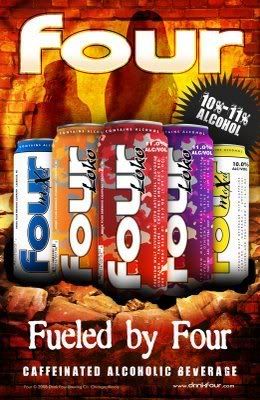The first is the alcoholic energy drink. According to the New York Times, companies who make products such as Joose and Four Loko now have 30 days to prove that their products are “safe”, otherwise the FDA will impose a ban on all caffeinated alcohol drinks.
We’re going to go out on a limb here and say that it’s obvious these drinks are anything but safe. As both the New York Times article and an article from 2008 in Time magazine have reported, combining a stimulant (caffeine) with a depressant (alcohol) will most likely cause you to underestimate how drunk you really are. You might feel like you are not impaired, but your BAC will tell a different story.
And while many news stories comment on the high alcohol content, they don’t mention what that higher alcohol content means. Let’s compare a traditional serving of beer with a can of Four Loko (which has one of the highest alcohol contents of the caffeinated drinks currently on the market). A beer is 12 oz, and a can of Four Loko is almost 24 oz. A serving of beer typically has around 5.0% alcohol by volume. A Four Loko can have as much as 12% alcohol by volume. So the serving size is twice as large, AND the alcohol content is more than doubled. If you do the math, you’ll find that drinking a can of Four Loko is like drinking FOUR beers.

Wait a minute, isn’t four beers (in a short amount of time, say, two hours) the definition of binge drinking? (at least for women, since that’ll get your BAC up to about 0.08 – it’s around five drinks in the same time frame for men). Hopefully, the risks are becoming clear. People don’t know how much they’re drinking, will drink it quickly, and won’t notice how drunk they are due to the caffeine.
And that’s not all. Researchers at Wake Forest University found that students who drank alcohol with energy drinks, when compared to those who drank alcohol that wasn’t mixed with energy drinks, were more likely to be injured, to ride with a drunk driver, or to be the victim or perpetrator of sexual assault. There’s even a risk for heart problems, since you’re sending two opposing messages to your central nervous system. With evidence like this, we sincerely hope the FDA (and the beverage companies) will do the right thing and take these products off the shelves.
The other beverage is relatively new, but it’s no less mind-boggling than the first. The founder of a company that runs several nightclubs and bars has created Devotion Spirits, which boasts the world’s first vodka infused with – wait for it – protein.

The brains behind the operation, Drew Adelman, came up with the idea as a product for people who are serious about their fitness – and apparently about their partying. The product claims include that the protein lessens the harsh taste of vodka, creates a smoother feel, and minimizes your hangover.
Again, we hope it’s glaringly obvious that this product is neither a miraculous non-hangover-inducing alcohol, nor a good idea for true fitness buffs. Just one night of heavy drinking can have the equivalent of 14 days of lost training (American Athletic Institute, 2004). Adding protein can’t and won’t change that. And we won’t even begin to describe our horror when we learned that the graphics on the product’s “sexy bottle” (the company’s words, not ours) were inspired by Mr. Adelman’s daughter. While the site doesn’t mention her age, it definitely sounds like she’s very young.
Let’s be clear: moderate drinking by adults over 21 is not a bad thing. But the very existence of these products encourage underage or irresponsible consumption. Let’s think about what we’re telling youth—and ourselves—about the consequences of drinking.




Hi. I'm trying to find a copy of the Four Ad at the top of the page which says "Fueled by Four". Do you know when that ad was printed?
ReplyDeleteSorry, Elyse, I don't. I grabbed the image from a photobucket account.
ReplyDelete